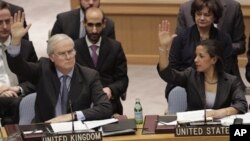The United Nations Security Council has voted unanimously to impose sanctions against Libyan leader Moammar Gadhafi, his immediate family and his top associates in connection with the regime's deadly response to anti-government protests, and to refer the matter to a war crimes tribunal.
The resolution, passed Saturday evening, freezes the assets of Mr. Gadhafi, his four sons, a daughter and 10 members of his inner circle. It also imposes a travel ban on all 16. Council members also agreed to refer the regime's crackdown to a permanent war crimes tribunal for an investigation of possible crimes against humanity.
The council also again demanded an immediate end to attacks on Libyan civilians by Mr. Gadhafi's supporters.
The United Nations says more than 1,000 anti-government protesters have been killed in Libya.
In Washington, U.S. President Barack Obama says Mr. Gadhafi has "lost the legitimacy to rule" and should step down immediately.
The White House said that Mr. Obama made the remarks in a telephone conversation Saturday with German Chancellor Angela Merkel.
The statement adds that the U.S. and German leaders shared "deep concerns" about the ongoing violent crackdown against protesters in Libya, and discussed "appropriate and effective ways" for the international community to respond.
Also Saturday, Secretary of State Hillary Clinton said the U.S. was taking steps to hold Mr. Gadhafi's government "accountable for its violation of human rights." She said the State Department has revoked the U.S. visas held by Libyan leaders and members of their immediate family.
Mr. Obama Friday signed an executive order imposing unilateral sanctions on Libya, saying continued unrest and violence there posed an "unusual and extraordinary threat" to U.S. national security and foreign policy. The same day, the European Union agreed to impose an arms embargo on Libya, along with a travel ban and assets freeze.
Italy's prime minister - formerly an ally of Mr. Gadhafi - says it appears the Libyan leader is no longer in control of the country. Silvio Berlusconi said Saturday if the international community pulls together, it can stop the "bloodbath and support the Libyan people."
The U.N. said Mr. Ban phoned Mr. Berlusconi Saturday to discuss Libya and ask for Italy's support in the international effort to handle the crisis. The U.N. said Mr. Ban also reached out to Saudi Arabia's King Abdullah, underscoring Saudi Arabia's key religious and political role in the region.
The U.N. High Commissioner for Human Rights, Navi Pillay, says there are reports of mass killings in Libya that should spur the international community to step in to end the violence. She called for an independent investigation of the reports that thousands of Libyans have been killed or wounded by Libyan security forces.
UN Security Council Imposes Sanctions on Libyan Leaders




